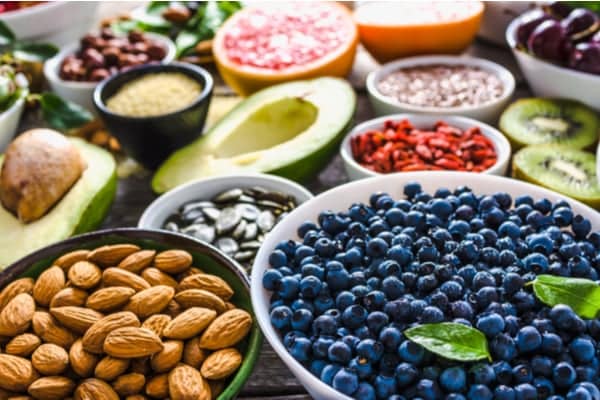Looking for a non-dairy alternative for optimal health and performance? Whether you make smoothies on a regular basis or enjoying a morning bowl of cereal, you’re probably using dairy or non-dairy milk. Nowadays it is common to see in the grocery many different types of milk besides just dairy and soy.
Here are some other non-dairy milks you may be interested to try:
Almond Milk
Unsweetened Almond milk is one of the lowest calorie non-dairy milks, and has a creamy, nutty taste. You can also easily make your own almond milk by soaking raw almonds for 8 hours, and then puréeing them in a high-speed blender. Press out the pulp in a strainer or cheesecloth and pure almond milk remains.
Cashew Milk
Cashew milk is a non-dairy milk, which means it contains no lactose. In its most basic form, it’s made from filtered water and cashews. Many raw food recipes call for cashew milk or another “nut milk”. Raw cashew milk is also delicious on its own, as a vegan milk substitute with a breakfast cereal or spiced with a bit of cinnamon and nutmeg. Homemade cashew milk is better and more nutritious than store bought.
Oat Milk
Oat milk is a wonderful way to receive essential nutrition from a natural, lactose free, and sustainable source every day. Oats have many healing properties and are best known for their high protein and fiber content and cholesterol reducing abilities. One of the advantages of oats over other grains is that it contains high levels of protein similar to those found in legumes. Oat milk also contains 10 essential minerals and 15 vitamins, is a low fat alternative containing just 2.5 grams of fat and 0 grams of saturated fat per serving when compared to milk’s 8 grams of fat and 5 grams of saturated fat. It is also cholesterol free, whereas whole milk contains 24mg of cholesterol per serving.
Hazelnut Milk
Hazelnut milk is naturally gluten-, lactose-, and soy-free. It is low in calories, containing no cholesterol or saturated fat. It is a good source of vitamins B1, B2 and B6 which are all essential in blood formation and mental health. Hazelnuts are also an excellent source of the antioxidant vitamin E which promotes healthy hair and skin, as well as boosting the health of the heart muscles.
{{cta(‘8c7c8cff-00e5-4cb0-844a-5352a5b5029f’,’justifycenter’)}}
Coconut Milk
If you’re vegan, lactose-intolerant or just don’t enjoy the taste of dairy milk, coconut milk is a viable plant-based alternative that contains no lactose and has a pleasant, creamy texture. Although regular canned coconut milk is higher in calories and fat than whole dairy milk, the plant-based saturated fat in coconut milk may provide health benefits not found in the animal-based saturated fat in dairy milk. Coconut milk is higher in saturated fat than other types of non-dairy milk, but most of this saturated fat is in the form of Medium Chain Triglycerides—which burn like carbohydrates for energy. Furthermore, coconut milk is lower in sugar than dairy milk, which is beneficial if you’re trying to limit carbohydrates in your diet.
Hemp Milk
Hemp milk is made from shelled hemp seeds, and contains small amounts of Omega-3s. It has a nuttier taste than almond milk, but is a great base for smoothies or non-dairy puddings. Hemp milk is a great source of nutritious protein and is capable of delivering the tough-to-find amino acid, GLA. Hemp milk is rich in protein and contains omega-3 and omega-6 fatty acids, vitamins A, E, B-12 and folic acid, and is rich in magnesium, potassium, iron and magnesium. All essential nutrients for a healthy diet and immune system.
Rice Milk
With a light taste, not too different from water, rice milk is a great option if you have multiple food sensitivities or allergies. Rice milk is higher in carbohydrates than most other non-dairy milks, so it can make a good pre-workout beverage.
Soy Milk
Soy milk, which is made from soaking, grinding and boiling soy beans with water, is a very nutritious drink. Soy is naturally high in essential fatty acids, proteins, fiber, vitamins and minerals. These nutrients provide energy and keep your body functioning at its optimum level. Many people avoid soy milk because they have a sensitivity to it. If you enjoy the smooth taste and high protein content of soy milk, but sure to choose organic and non-GMO verified soy milk (soy is a common genetically modified crop).
Other alternatives
Other milk alternatives to try include quinoa milk, potato milk, 7-Grain milk (from oats, rice, wheat, barley, triticale, spelt and millet) and sunflower milk.
Check out The Plant-Based Dairy Alternatives Guide by Sharon Palmer, RD for a comparison chart detailing serving size calories, protein, fat, sugar content and flavor profile of each of the milks mentioned above.
What’s your favorite type of non-dairy milk?
{{cta(‘a7bb1718-22d3-4987-80f1-5e01154e492d’,’justifycenter’)}}



